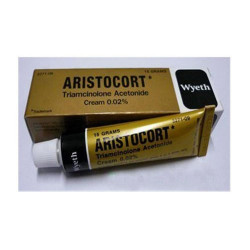Aristocort (triamcinolone) Coupons and Discounts
Aristocort (triamcinolone) is a hormonal drug from the group of glucocorticosteroids. One way to save money on the Aristocort (triamcinolone) retail cost regardless of income and insurance status is to use Aristocort (triamcinolone) coupons or discount cards from RXCoupons. Use our Aristocort (triamcinolone) coupons at your online pharmacy and receive up to 75% off the sale price each time you refill your prescription.
Aristocort (triamcinolone) pharmacologic effect
Aristocort (triamcinolone) is a hormonal drug from the group of glucocorticosteroids. Triamcinolone is used as an antiallergic, immunosuppressive, and anti-inflammatory glucocorticoid agent.
When should I use Aristocort (triamcinolone)?
Aristocort (triamcinolone) has various preparation forms depending on the specific disease.
Triamcinolone tablets should be taken in such cases as rheumatoid arthritis and rheumatism, systemic lupus erythematosus, severe allergic reactions, skin diseases caused by allergies, asthma, hemolytic anemia, hemorrhagic diathesis, erythema multiforme, leukemia and lymphoma.
Triamcinolone in the form of inhalations should be used in asthma exacerbation, allergic rhinitis, hormone-dependent bronchial asthma.
Triamcinolone injectable suspension is used in rheumatoid arthritis, connective tissue diseases, dermatosis, systemic lupus erythematosus, emphysema or pulmonary fibrosis, lymphosarcoma, lymphatic leukemia, nephrotic syndrome.
Triamcinolone cream is recommended for eczema, psoriasis, atopic dermatitis, as well as other allergic and inflammatory diseases of the skin as a component of complex therapy.
What should I know about Aristocort (triamcinolone) contraindications?
Aristocort (triamcinolone) is not recommended for patients with the following diseases: acute psychosis, active tuberculosis, myasthenia gravis, diverticulitis, tumors with metastases, duodenal ulcer, arterial hypertension, renal failure, Cushing's syndrome, thrombosis and embolism, osteoporosis, amyloidosis, diabetes, fungal and viral infections (including herpes), gonococcal and tuberculous arthritis, glaucoma, certain skin infections.
Aristocort (triamcinolone) instructions for use
According to the instructions, Aristocort (triamcinolone) should be taken in the following dosages:
Triamcinolone tablets: adults should take from 4 to 20 mg per day, frequency of administration - 2-3 times per day. The daily dose of triamcinolone may be reduced to 2 mg taken every 2-3 days. The maintenance dose is 1 mg per day.
Triamcinolone for intramuscular administration: the dosage is 40 mg once every 4 weeks. The dosage may be increased up to 80 mg every 2-4 weeks. If necessary, the dose may be increased to 100 mg.
The dose of triamcinolone for inhalation is calculated based on the patient's age.
Triamcinolone cream is used three times a day. The duration of treatment should not exceed 10 days. In rare cases, treatment may be prolonged up to 25 days. It is not recommended to use the cream for more than 4 weeks.
What should I know about Aristocort (triamcinolone) side effects?
Before starting Aristocort (triamcinolone) therapy, patients should discuss the risks associated with the therapy (in order to avoid complications). In some cases, triamcinolone may cause menstrual irregularities, increase in blood sugar level, acne, hirsutism, edema, symptoms of electrolyte imbalance, growth retardation in children, peptic ulceration, acute pancreatitis, erosive and ulcerative lesions of the gastrointestinal tract, convulsions, sleep disorders and mental disorders, headaches, weakness, myopathy and osteoporosis, hypertension, thromboembolism, visual impairment, high intraocular pressure, anaphylactic reactions,.
In addition, there are side effects specific for each triamcinolone form: injections may cause the appearance of joint pain, irritation at the site of injection, sterile abscess, depigmentation, skin atrophy. Inhalation may cause sneezing, coughing, headache, dry nasal cavities or membranes of the mouth, hoarseness, and fungal infections such as Candida albicans. Aristocort cream can cause itching, eczema, irritation, purpura and steroid acne. Prolonged use of triamcinolone may lead to atrophic changes of the skin and secondary infections.
Aristocort (triamcinolone) important information
Do not apply Aristocort (triamcinolone) cream on large skin areas. Avoid prolonged use in children regardless of age. It is possible to use triamcinolone in combination with antimicrobial drugs. Please note that triamcinolone should be kept in a dark place.

